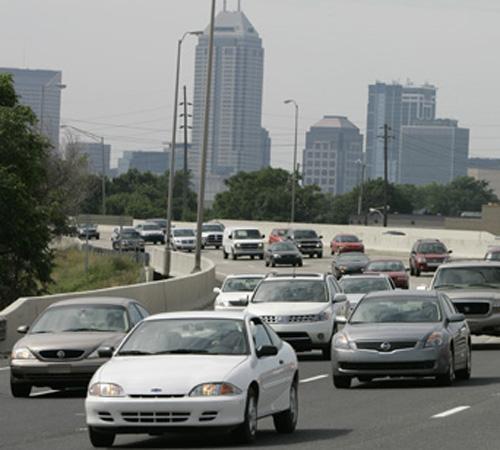Traffic deaths fall while gas prices soar

Motorists leave the city of Indianapolis at rush hour on July 7. Traffic deaths in many states this year are on track to post their biggest percentage decline since the Arab oil embargo in the 1970s as motorists reduce their driving amid record-setting ga Darron Cummings, The Associated Press
Jul 23, 2008
Last updated on May 13, 2016 at 12:38 p.m.
COLUMBUS, Ohio – Rising prices at the gas pump appear to be having at least one positive effect: Traffic deaths around the country are plummeting
Researchers with the National Safety Council report a 9 percent drop in motor vehicle deaths overall through May compared with the first five months of 2007, including a drop of 18 percent in March and 14 percent in April.
Preliminary figures obtained by The Associated Press show that some states have reported declines of 20 percent or more. Thirty-one states have seen declines of at least 10 percent, and eight states have reported an increase, according to the council.
No one can say definitively why road fatalities are falling, but it is happening as Americans cut back sharply on driving because of record-high gas prices.
Get The Daily Illini in your inbox!
Fewer people on the road means fewer fatalities, said Gus Williams, 52, of Albany, Ga., who frequently drives to northern Ohio. “That shows a good thing coming out of this crisis.” He has also noticed that many motorists are going slower.
The federal government reported in April that miles traveled fell 1.8 percent in April compared with a year earlier, continuing a trend that began in November.
Experts say a slumping economy and fuel prices have brought down the number of road fatalities in a hurry.
“When the economy is in the tank and fuel prices are high, you typically see a decline in miles driven and traffic deaths,” said John Ulczycki, the council’s executive director for transportation safety.
States also cite other factors such as police stepping up their pursuit of speeders and drunken drivers, as well as better teen-licensing programs, safer vehicles and winter weather that kept many drivers at home. The Governors Highway Safety Association also says seat belt use is probably at record levels and will top 90 percent in several states when figures are released later this year.
But the last time road deaths fell this fast and this sharply was during the Arab oil embargo in 1973-1974, when fatalities tumbled 17 percent, from about 55,100 to 46,000; and as states raised the drinking age to 21 in 1982-83, when fatalities fell 11 percent, from roughly 49,300 to 44,000.
Chuck Hurley, a former official with the National Safety Council and the Insurance Institute for Highway Safety, said half of the decline in road deaths during the 1970s was attributed to high gas prices. The remainder was linked to the lowering of freeway speed limits to 55 mph.
Republican Sen. John Warner of Virginia has said Congress might want to consider reimposing a national speed limit.





